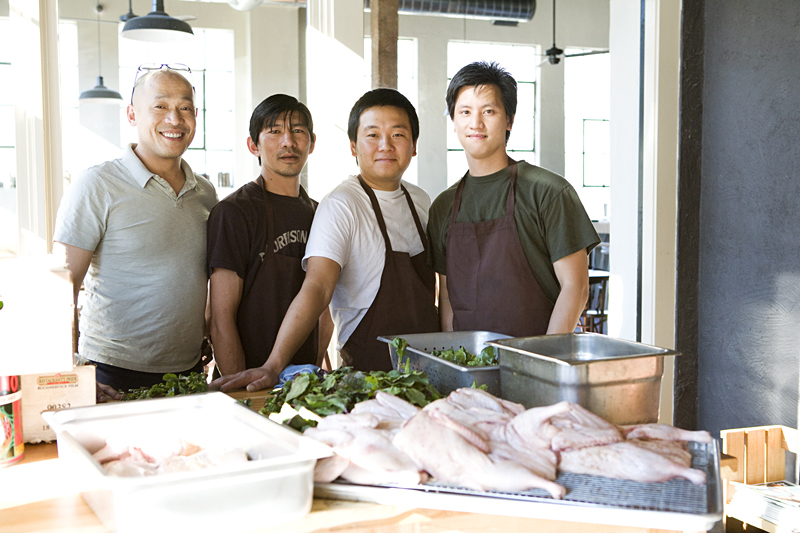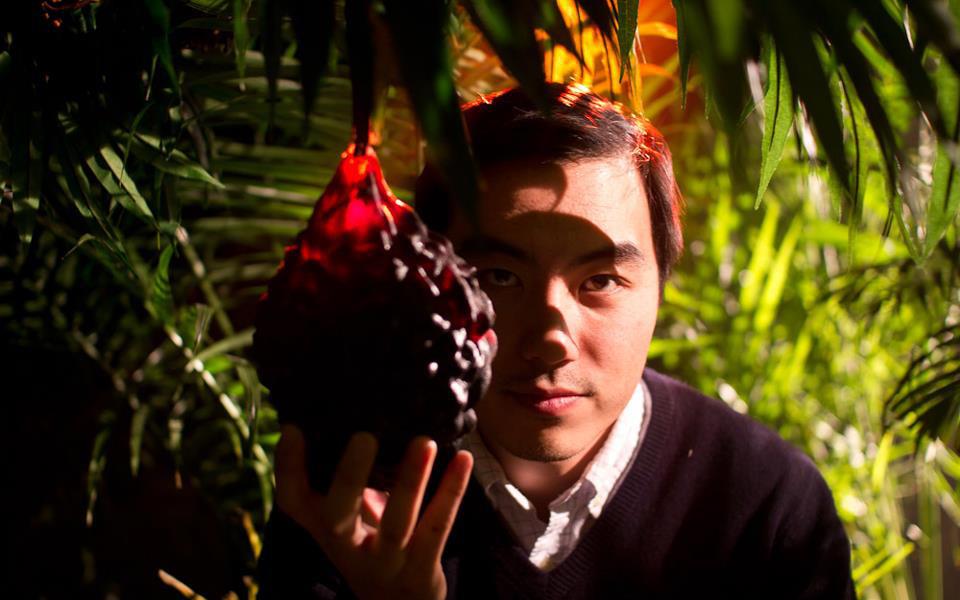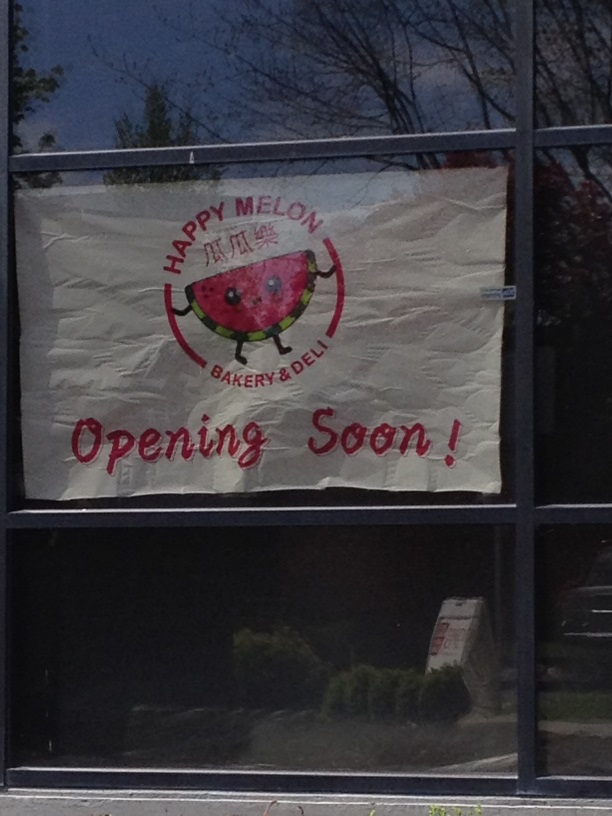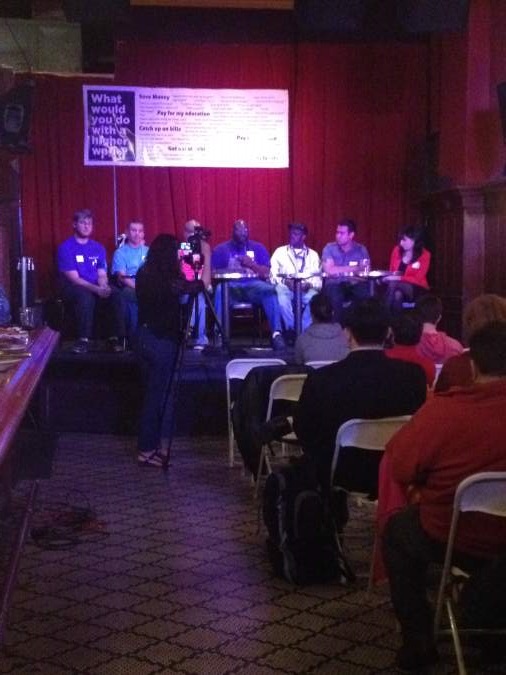In an eatery as engagingly fluctuant as Ba Bar, the dynamic haven of hard drink and Vietnamese comfort food that restaurateur Eric Banh recently opened in the former Watertown space near Seattle University, it’s a given that the daily specials menu harbors the kitchen’s best handiwork.
Here, where inspiration and intensity converge, diners will find one-off oddities made with various beasts and superb renditions of staples such as goi ga: a tumble of slivered red onions, snappy curlicues of paper-white cabbage, translucent radish crescents, chopped peanuts, basil leaves, and garlic cloves, showered with vinegar and coconut milk. The marinated salad’s brash acid could compel a vegetarian tongue to do a triple Lutz, but the dish is made even better by shreds of tender dark chicken, a textural rally partner to the salad’s crisp bedding.
“You can make this at home,” our server confided when he overheard my table kvelling over the salad.
When Banh, owner of Monsoon and Baguette Box, first announced plans for Ba Bar, he was greeted by gripes that many of the restaurant’s mainstay dishes could be had more cheaply down the block in the International District. It’s a charge frequently—and unfairly—leveled against chefs who choose to work in culinary idioms associated with developing countries. Many eaters still consider it their prerogative to get change from a $10 bill when buying tacos or pho. Yet their rigid version of restaurant economics insults talented practitioners such as Banh, who’s invested in the highest-quality ingredients and a dining room so beautifully lit it could double as a photo studio for a food magazine.
There are soups and noodles on Ba Bar’s menu that could perhaps be found elsewhere, or, per our kindhearted server’s suggestion, replicated at home. But it’s exceedingly unlikely that any of those settings would offer the same extraordinary cocktails or the stylish, kinetic spirit that pervades the restaurant.
Framed on two sides by tall casement windows with frosted panes, the dining room’s lofty ceiling is supported by distressed wooden columns that very nearly match the tables, the chairs, and the massive liquor cabinet that occupies all but a few yards of the back wall, where the restaurant’s hung a projection screen for kung-fu films and karaoke sessions. The studiously rustic decor is completed by plain glass water beakers and cups. In a restaurant-industry paraphrase of Dolly Parton’s famous comment about how much money it costs to look cheap, Banh told Capitol Hill Seattle Blog he had to double his construction budget to achieve the simple look he wanted.
Banh has used the phrase “street food” to describe what he’s serving at Ba Bar, but the term isn’t precisely correct. In addition to the lettuce wraps and vermicelli bowls which inevitably transform tabletops into riots of porcelain-hued noodles, leafy greens, and ramekins of nuoc cham, the restaurant serves a range of knife-and-fork dishes that would challenge even the most nimble street-food enthusiast. What’s street about Ba Bar is the implicit acknowledgment that food and drink are supposed to fit seamlessly into customers’ daily lives, not complicate or compete with them.
To that end, the restaurant keeps a punishing operating schedule. Ba Bar opens its foyer every day at 7 a.m. for the coffee-and-pastry crowd. Lunch starts at 11 a.m. and continues until around 6 p.m., when exhausted office workers come seeking revival in gin cocktails and grilled meat. Hours later, the bar’s crowded with servers from other restaurants, who’ve spent the evening ferrying food to ungrateful diners and plotting a self-congratulatory nightcap of bourbon and broken rice. By 1 a.m., they’re joined by partiers bent on securing one last drink and a bowl of beef broth. On weekend nights, pho continues to flow for a full two hours after the city-mandated last call. Ba Bar has become so indispensable to its many kinds of customers that it’s already acquired a slew of regulars: My showing up three times in as many weeks, a schedule which raises suspicion in certain restaurants, made me a stranger at Ba Bar. Within weeks of the restaurant’s opening, it wasn’t unusual to hear patrons ask one another: “What did you have last time?”
Most of the answers came with enthusiastic endorsements, since much of the food at Ba Bar is excellent. Service is considerably less reliable: My servers ran the gamut from doltish and disinterested to well-meaning but clumsy. I didn’t encounter any rudeness, but dealt with an array of small errors that warranted a “tsk tsk” in my notebook, including my first server’s failure to alert me to the existence of daily specials.
Still, being forced to order off the standing menu isn’t a hardship. That’s the route to the pho tai nam, a pleasingly mellow version of the classic soup, bobbing with thin noodles and delicate sheets of Painted Hills beef. If diners wish to up the beef quotient, they can enhance their order with tendon or meatballs, stunning ping-pong-ball-sized pods of concentrated beef flavor. Otherwise, they can meddle with the typical pho accoutrements: bean sprouts, jalapeños, lime wedges, and stalks of basil. Yet even without editing, the bracing broth is as restorative as a springtime walk and reverberates with citrus and chestnut notes; there are sufficient time-wrought nuances here to keep the colossal serving of soup interesting through the final spoonful.
Eaters who fancy duck shouldn’t miss the mi vit tiem, an egg-noodle soup so bodaciously ducky that it feels odd to approach it without an ear-flapped flannel cap. The broth is as dark as bay rum aftershave, and wonderfully rich. Stocked with a crinkly duck confit, chewy whole mushrooms, green onions, and red dates, the dish is understandably among Ba Bar’s most popular.
Ba Bar also serves a quartet of vermicelli concoctions in which the noodles don’t have to share bowl space with broth. These unbundled spring rolls are notable for their vigorous proteins, including crisp, porky imperial rolls; fat, sweet shrimp; and salty, thumb-sized bo mo chai, or ground beef, rolled like a sausage and grilled.
When ordering off the rotisserie menu, guests have the choice of fresh banh hoi or broken rice. Essentially the Vietnamese equivalent of grits, broken rice is the improperly processed, full-flavored grain favored by Vietnam’s poorest citizens. Eaters I trust have raved about the broken rice, but I can’t fathom turning down the astonishingly soft, quilted rice noodles.
There are a few duds at Ba Bar. I couldn’t muster much excitement for the Cornish-pasty-like banh pate so, featuring a flat-tasting meld of pork, carrots, and onions encased in a puff pastry. A meaty short rib sporting a thick caul of fat looked gorgeous on the plate, its caramel crust glistening beneath scattered rings of green onions, but was unevenly cooked. Served wrap-style with noodles, carrots, and squash, the dish is listed as a two-person affair, a designation its size doesn’t quite support. “Maybe only one out of two people likes it,” one of my tablemates quipped.
The short rib represents a rare meat misstep for Ba Bar, however. Meat is so scrupulously sourced here that even dishes which didn’t soar, including a grilled pork loin that felt perfunctory and a disappointingly tough steak frites, were still distinguished by perceptibly high-grade proteins. The pork tasted pure, and the steak rippled with a peppery earthiness.
Ba Bar has a limited dessert menu, but a cocktail is probably a better meal-ending choice. The bar here would be well worth patronizing even if there weren’t noodles and meats to wash down. Every cocktail I tried was balanced and refined. The house cocktails—including a pastel-pink concoction of gin and blackberry liqueur and a satisfying blend of bourbon, sherry, and pineapple syrup—are sassy but never sarcastic. Made with recognizable ingredients in sensible quantities, the drinks are as compelling as the dishes they’re designed to match.
Ba Bar’s cocktail program got off to a shaky start. The first bar manager, who reportedly had a penchant for wasting the restaurant’s money on unnecessary equipment and drinking after-hours, was fired after Banh learned he’d lied about working at a respected cocktail joint in San Francisco. Banh replaced him with Evan Martin of Naga Cocktail Lounge, whose riff on Planter’s Punch was named Tales of the Cocktail’s official drink in 2010.
Banh would surely prefer not to dwell on the gaffe, which was costly and potentially embarrassing. But his rebound hire and resilience speak to the restaurant’s ability to evolve and improve. It’s impossible to visit Ba Bar and not emerge with the sense that big ideas are incubating and execution is continually progressing. Ba Bar is very good now, and it’s positioned to get better still.
Price Guide
Banh pate so $5
Pho tai nam $9
Mi vit tiem $10
Combo vermicelli $12
Pork loin $14
Steak frites $15








